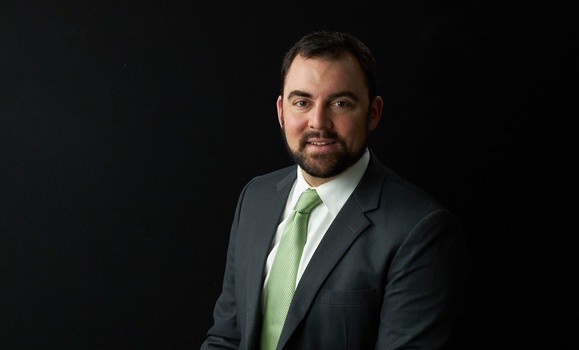While studying at the Schulich School of Law, David Taylor (LLB’12) received the Allister MacBain Memorial Scholarship — one of the most generous awarded to Canadian law students. It was what motivated Taylor to pursue his degree at Dalhousie and supported him as a law student. The scholarship is awarded to as many as three students each year, with a history of superior academic achievement, commitment to community service and involvement in extracurricular activities.
"I will always be grateful for the generosity and the opportunities it provided me," says Taylor.
His interest in law was sparked when Taylor served as a Senate Page during his undergraduate studies. He was struck by people coming to Parliament hoping to make a difference. "They were there trying to get a bill passed or making sure their stories were heard as part of a conversation to have their issue addressed,” says Taylor. “It was inspiring." It was the ability to effect change and help people that inspired him to pursue law. Now Taylor himself has spent the better part of the last decade advocating for the voices of First Nations children and their families.
Taylor is Legal Counsel for the First Nations Child and Family Caring Society. Since 2014, he has been part of the legal team representing the Caring Society in its human rights complaint against the federal government, brought alongside the Assembly of First Nations. The complaint, filed in 2007, alleged that the federal government discriminates against First Nations children by providing far less funding for child and family (child welfare) services on-reserve than was available to non-First Nations children, leading to incentives to remove First Nations children from their families and place them into foster care.
And in 2016, the Canadian Human Rights Tribunal (CHRT) ruled in their favour. The landmark ruling ordered Canada to stop non-equitable funding of child and family services for First Nations children on reserves.
"It was significant to have the discrimination against First Nations children recognized in a way that allowed us to get legally binding orders on the government and force them to address this discrimination. It was inspiring in terms of the way the law can work," says Taylor, now an Ottawa-based lawyer.
A win for First Nations children
The Tribunal also found the government guilty of failing to apply Jordan's Principle. The principle — named in memory of Jordan River Anderson, a young boy from Norway House Cree Nation in Manitoba — takes a child-first approach that aims to eliminate service inequities and delays for First Nations children.
In 2017, Taylor had the chance to stand up for the rights of First Nations children once again.
"It was part of the case I was privileged to lead. I had the opportunity to do the cross-examination, wrote the argument and led the hearing,” he says. Ultimately, the Tribunal found that Canada was too narrow with the principle and First Nations children continued to have lesser outcomes.
The ruling was a win for First Nations children and their families. Since then, services and supports approved under Jordan's Principle have increased from 3,400 to more than 985,000, meaning that First Nations children have far greater access to educational support, medical equipment, mental health services and more.
"Concerning Jordan's Principle, it's not just equal access to services, but equitable outcomes and providing culturally appropriate services. Ultimately, more children are getting access to the services they need," says Taylor.
Continued effort
Today the sprawling and ongoing case continues. "We are still working on long-term reform...now it is about making sure the government holds up those orders."
He acknowledges it's been a long road, but he draws inspiration from Cindy Blackstock (LLD’18), executive director of the First Nations Child and Family Caring Society. She first launched the case against the government in 2007. Ultimately, her advocacy has resulted in a wide range of services now being provided to First Nations children, youth and families.
"She has been working on these issues for 30 years. She has such a positive attitude and is a pillar of strength,” he says.
A chance meeting with John McCall MacBain
In 2018, Taylor was present when Dr. Blackstock received an honorary degree from the University of Ottawa for her advocacy work on behalf of First Nations children and their families.
And it was there he had the chance to make a Dalhousie connection with Dr. John McCall MacBain, who was also receiving an honorary degree. It was Dr. McCall MacBain’s father, Allister (Al) MacBain (LLB’51), whose name was on the scholarship that supported Taylor through Dal Law. The men were delighted to meet in person at the Ottawa ceremony.
“Scholarships are an attempt to match opportunity with talent. The hope is that some of the scholars will give back to their communities to make a lasting contribution,” said John McCall MacBain. “David is a great example of a scholar giving back in such a meaningful way and at such an early age. The McCall MacBain Foundation is proud to count David as one of the MacBain Memorial Scholars.”
Comments
comments powered by Disqus

